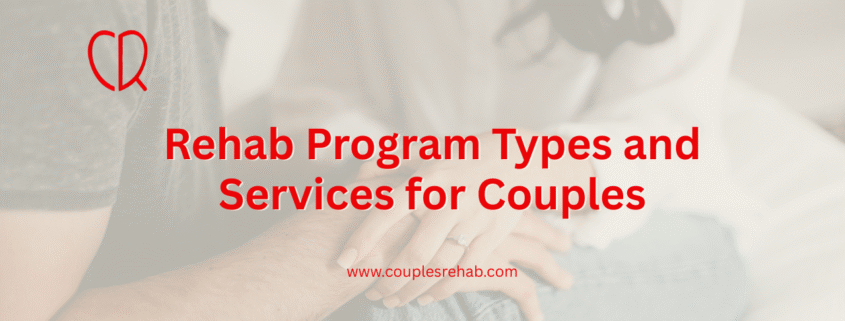Rehab Program Types and Services for Couples
When addiction affects both partners in a relationship, the journey to recovery becomes more complex but also more hopeful. Rehab program types and services for couples offer specialized treatment approaches that address both individual healing and relationship restoration simultaneously. At Couples Rehab, we understand that addiction doesn’t just impact the individual—it creates ripple effects throughout the entire relationship dynamic.
The landscape of couples addiction treatment has evolved significantly over the past decade. Research consistently shows that couples who enter recovery together have higher success rates and stronger long-term sobriety outcomes compared to those who attempt individual treatment while maintaining their relationship. This comprehensive guide explores the various rehab program types and services for couples, helping you understand which treatment approach might be the best fit for your unique situation.
Whether you’re dealing with substance abuse, behavioral addictions, or co-occurring mental health disorders, the right couples treatment program can provide the foundation for both personal recovery and relationship healing. Let’s explore the comprehensive range of options available to couples ready to embark on their recovery journey together.
Understanding Couples Addiction Treatment
Couples addiction treatment represents a specialized field within the broader addiction recovery landscape. Unlike traditional individual treatment programs, couples treatment programs address the complex interplay between addiction and relationship dynamics. This approach recognizes that addiction often develops within the context of relationships and that sustainable recovery requires healing both the individual and the partnership.
The fundamental principle behind couples addiction treatment is that addiction is a family disease. When one or both partners struggle with substance abuse, it creates patterns of codependency, enabling behaviors, and emotional trauma that extend far beyond the individual user. These relationship dynamics can either support recovery or inadvertently sabotage treatment efforts.
Research from the Journal of Substance Abuse Treatment indicates that couples who participate in joint treatment programs show a 40% higher retention rate compared to individual treatment alone. This statistic underscores the importance of addressing relationship factors as an integral part of the recovery process.
At Couples Rehab, our treatment philosophy centers on the belief that healing happens in relationship. We’ve observed that couples who engage in treatment together develop stronger communication skills, healthier coping mechanisms, and more robust support systems for maintaining long-term sobriety.
Comprehensive Types of Couples Rehab Programs
Inpatient Rehab for Couples
Inpatient rehab for couples represents the most intensive level of care available for couples struggling with addiction. This residential treatment option provides 24/7 medical supervision and therapeutic support within a structured, substance-free environment. Couples typically spend 30 to 90 days in residential treatment, though program length varies based on individual needs and progress.
The primary advantage of inpatient rehab for couples lies in its comprehensive approach to addressing both addiction and relationship issues simultaneously. During residential treatment, couples participate in individual therapy, joint counseling sessions, group therapy with other couples, and educational workshops focused on relationship skills and addiction recovery.
Medical supervision during inpatient treatment ensures safe withdrawal management and monitoring of any co-occurring mental health conditions. Many couples find that the intensive nature of residential treatment allows them to make significant breakthroughs in both their recovery and their relationship that might take months or years to achieve in outpatient settings.
Couples Rehab’s inpatient program includes specialized tracks for different populations, ensuring that treatment approaches are culturally sensitive and appropriate for each couple’s unique background and needs. Our residential facilities provide separate accommodation options while maintaining the ability for couples to participate in joint therapeutic activities throughout their stay.
Outpatient Couples Rehab
Outpatient couples rehab offers flexibility for couples who need to maintain work, family, or educational commitments while receiving treatment. This treatment modality allows couples to live at home while attending scheduled therapy sessions, group meetings, and educational programs at our treatment facility.
The structure of outpatient couples rehab varies significantly based on the level of care required. Intensive Outpatient Programs (IOP) typically require 9-12 hours of treatment per week, while standard outpatient programs may involve 3-6 hours of weekly commitment. This flexibility makes outpatient treatment accessible to couples who have completed residential treatment and are transitioning back to daily life.
One significant benefit of outpatient treatment is the opportunity for couples to immediately practice new skills and coping strategies in their real-world environment. Rather than learning about communication techniques in a residential setting, couples can implement these tools at home and discuss challenges and successes during their next therapy session.
Couples Rehab’s outpatient programs incorporate evidence-based treatment approaches including Behavioral Couples Therapy (BCT), Emotionally Focused Therapy (EFT), and the Gottman Method. These therapeutic modalities specifically address the intersection of addiction and relationship dynamics, helping couples develop both sobriety skills and relationship resilience.
Detox for Couples
Detox for couples addresses the critical first phase of addiction treatment when one or both partners need medical supervision to safely withdraw from substances. Medical detoxification ensures that withdrawal symptoms are managed safely and comfortably, reducing the risk of medical complications and providing a foundation for ongoing treatment.
The unique aspect of detox for couples is the emotional support that partners can provide each other during this challenging phase of recovery. While medical protocols remain the same as individual detox, having a partner present can significantly reduce anxiety and provide motivation during difficult moments.
Couples detox programs typically last 3-7 days, depending on the substances involved and the severity of physical dependence. During this time, medical staff monitor vital signs, administer medications to manage withdrawal symptoms, and provide 24/7 nursing care to ensure safety and comfort.
At Couples Rehab, our detox program includes couples counseling sessions as soon as clients are medically stable. These sessions help partners understand the detox process, manage expectations for ongoing treatment, and begin addressing immediate relationship concerns that may have contributed to or resulted from active addiction.
The transition from detox to ongoing treatment is carefully planned to maintain momentum and engagement. Couples who complete detox together often feel a renewed sense of partnership and shared commitment to recovery that carries forward into their continuing treatment experience.
Specialized Couples Treatment Programs
Dual Diagnosis Couples Treatment
Dual diagnosis couples programs address the complex needs of partners where one or both individuals struggle with co-occurring mental health disorders alongside addiction. Statistics indicate that approximately 50% of individuals with substance use disorders also experience mental health conditions such as depression, anxiety, PTSD, or bipolar disorder.
When both partners have dual diagnoses, treatment becomes significantly more complex but also more crucial for long-term success. Dual diagnosis couples treatment integrates psychiatric care, medication management, individual therapy, and couples counseling to address all aspects of each partner’s mental health and relationship dynamics.
The treatment approach for dual diagnosis couples typically involves longer treatment durations and more intensive therapeutic interventions. Couples learn to recognize how mental health symptoms impact their relationship and develop strategies for supporting each other’s ongoing mental health management while maintaining their own recovery.
Couples Rehab’s dual diagnosis program includes specialized staff trained in both addiction treatment and mental health care. Our integrated approach ensures that medication management, therapy schedules, and couples work are coordinated to provide the most effective treatment possible.
Insurance for Couples Rehab
Understanding insurance for couples rehab is crucial for couples considering treatment options. Most insurance plans provide some coverage for addiction treatment, but the specifics of what’s covered can vary significantly between individual and couples treatment programs.
The Affordable Care Act requires insurance plans to cover substance abuse treatment as an essential health benefit. However, couples may need to navigate coverage differently since they’re typically considered as two separate patients under most insurance policies. This means that while each partner’s individual treatment components are likely covered, joint couples therapy sessions may have different coverage parameters.
At Couples Rehab, our admissions team works directly with insurance providers to maximize coverage for both partners. We help couples understand their benefits, estimate out-of-pocket costs, and explore payment options that make treatment accessible. Many couples find that the long-term financial benefits of successful treatment far outweigh the initial investment in recovery.
We also work with couples to identify alternative funding sources when insurance coverage is limited. These may include employee assistance programs, health savings accounts, payment plans, and financing options specifically designed for addiction treatment.
Christian Couples Rehab
Christian couples rehab programs integrate faith-based approaches with evidence-based addiction treatment methods. These programs recognize that spirituality and religious beliefs can play a significant role in both the development of addiction and the recovery process.
Faith-based couples treatment incorporates prayer, biblical study, Christian counseling approaches, and fellowship with other couples who share similar beliefs. The program structure includes traditional addiction treatment components while also addressing spiritual aspects of recovery and relationship healing.
Many couples find that Christian couples rehab provides a framework for understanding their addiction and relationship challenges within the context of their faith. This approach can be particularly helpful for couples who feel that their addiction has created distance from their spiritual beliefs and religious community.
Couples Rehab offers specialized Christian treatment tracks that honor diverse denominational backgrounds while maintaining clinical excellence. Our faith-based programs include chaplain services, Christian-focused therapy approaches, and connections to local faith communities for ongoing support after treatment completion.
LGBTQ Couples Rehab
LGBTQ couples rehab addresses the unique challenges and needs of lesbian, gay, bisexual, transgender, and queer couples in recovery. LGBTQ individuals often face additional stressors related to discrimination, family rejection, and minority stress that can contribute to substance abuse and complicate treatment.
Specialized LGBTQ couples rehab programs provide culturally competent care that understands the intersection of sexual orientation, gender identity, and addiction recovery. Treatment staff receive specific training on LGBTQ issues and create affirming environments where couples can address their recovery needs authentically.
These programs often address unique relationship dynamics within LGBTQ partnerships, including coming out processes, family of origin issues, discrimination experiences, and community connection. The therapeutic approach acknowledges that LGBTQ couples may have different relationship structures and support systems compared to heterosexual couples.
Couples Rehab’s LGBTQ program includes connections to LGBTQ-affirming community resources, specialized group therapy for LGBTQ couples, and ongoing support for maintaining recovery within LGBTQ communities. We recognize that visibility and acceptance within treatment settings significantly impact recovery outcomes for LGBTQ couples.
Evidence-Based Treatment Approaches
Couples addiction treatment utilizes several proven therapeutic approaches that address both individual recovery and relationship healing. These evidence-based methods have demonstrated significant success in helping couples achieve long-term sobriety while strengthening their partnerships.
Behavioral Couples Therapy (BCT) represents one of the most researched approaches to couples addiction treatment. BCT focuses on improving relationship functioning while supporting both partners’ recovery goals. Research shows that couples participating in BCT have significantly lower relapse rates compared to individual treatment alone.
Emotionally Focused Therapy (EFT) addresses the emotional bonds and attachment patterns that influence both addiction and relationship dynamics. EFT helps couples understand how addiction has impacted their emotional connection and provides tools for rebuilding trust and intimacy in recovery.
The Gottman Method applies decades of relationship research to help couples build skills that support long-term sobriety and relationship satisfaction. Key components include learning to manage conflict constructively, building fondness and admiration, and creating shared meaning within the relationship.

What to Expect During Treatment
The treatment process begins with a comprehensive assessment that evaluates both individual addiction issues and relationship dynamics. This includes medical evaluation, psychiatric screening, and relationship functioning assessment to create personalized treatment plans.
Treatment Integration: Successful couples treatment balances individual therapy work with couples counseling sessions. Individual therapy addresses personal trauma and addiction-specific concerns, while couples sessions focus on relationship dynamics and mutual support strategies.
Family Support: Many programs include family therapy components that address addiction’s broader impact on extended family members. Support system development extends to recovery communities, spiritual groups, and social networks that support long-term sobriety.
Long-Term Success and Recovery Maintenance
Relapse Prevention: Couples learn to identify relationship-specific triggers and develop strategies for maintaining both individual sobriety and relationship health. This includes communication agreements about discussing cravings and plans for accessing professional help when needed.
Ongoing Support: Aftercare planning includes continued therapy, support group participation, and regular check-ins with treatment providers. Many couples benefit from couples recovery support groups where they connect with others facing similar challenges.
Research consistently demonstrates that couples who participate in treatment together have better outcomes than those pursuing individual treatment. Studies show 40% higher retention rates and sustained improvements in both recovery and relationship measures at long-term follow-up assessments.
Frequently Asked Questions About Rehab Program Types and Services for Couples
1. How long do couples rehab programs typically last?
Couples rehab program duration varies based on individual needs and treatment intensity. Inpatient programs typically range from 30-90 days, while outpatient programs may continue for 3-12 months or longer. The length of treatment depends on factors such as addiction severity, mental health needs, relationship issues, and individual progress in recovery.
2. Can couples stay together during residential treatment?
Most couples rehab facilities provide separate sleeping accommodations while allowing couples to participate in joint therapeutic activities during the day. This arrangement supports individual recovery work while maintaining the relationship focus of treatment. Specific policies vary by facility, so it’s important to discuss accommodation preferences during the admission process.
3. What if only one partner wants to get sober?
While couples treatment is most effective when both partners are committed to recovery, many programs can accommodate situations where motivation levels differ. Treatment approaches may include motivational interviewing techniques to help the less motivated partner explore their readiness for change while providing support for the partner who is ready to begin recovery.
4. Do both partners need to have addiction issues to qualify for couples treatment?
Couples treatment programs serve various relationship configurations, including couples where only one partner has a substance use disorder. These programs address the impact of addiction on both partners and help the non-addicted partner understand their role in supporting recovery while maintaining their own wellbeing.
5. How much does couples rehab cost, and what does insurance typically cover?
Costs vary significantly based on program type, duration, and location. Insurance coverage depends on individual policies, but most plans provide some coverage for addiction treatment. Many facilities offer payment plans and work with insurance providers to maximize coverage. It’s essential to contact both your insurance company and potential treatment providers to understand your specific coverage and costs.
6. What happens if we decide to end our relationship during treatment?
Treatment providers are prepared to help couples navigate relationship decisions during recovery. If couples decide to separate during treatment, programs typically provide support for transitioning to individual treatment while ensuring both partners continue receiving appropriate care. The goal is supporting each individual’s recovery regardless of relationship outcomes.
7. Are there specialized programs for LGBTQ couples or couples with specific religious beliefs?
Many treatment facilities offer specialized tracks for LGBTQ couples, faith-based programs, and culturally specific treatment approaches. These specialized programs provide affirming environments and culturally competent care that addresses unique needs and challenges faced by different populations.
8. What types of therapy are included in couples rehab programs?
Couples rehab programs typically include individual therapy, couples counseling, group therapy, family therapy, and educational workshops. Specific therapeutic approaches may include Behavioral Couples Therapy, Emotionally Focused Therapy, Cognitive Behavioral Therapy, and various addiction-focused interventions.
9. How do we choose between inpatient and outpatient couples treatment?
The choice between inpatient and outpatient treatment depends on factors such as addiction severity, medical needs, work and family obligations, previous treatment history, and level of environmental support. Treatment professionals can help assess these factors and recommend the most appropriate level of care.
10. What kind of support is available after completing couples rehab?
Aftercare support typically includes continuing therapy, support group participation, alumni programs, crisis intervention services, and ongoing case management. Many programs provide long-term follow-up services and maintain relationships with clients throughout their recovery journey to provide ongoing support and resources.
Taking the Next Step: Your Journey to Recovery Together
The decision to pursue rehab program types and services for couples represents a courageous commitment to both individual healing and relationship restoration. At Couples Rehab, we understand that this decision comes after careful consideration and often significant struggle with addiction’s impact on your partnership.
Every couple’s journey to recovery is unique, shaped by individual histories, relationship dynamics, and personal goals for the future. The comprehensive range of treatment options available ensures that couples can find programs that meet their specific needs while providing the flexibility to adjust treatment approaches as recovery progresses.
The evidence is clear: couples who enter recovery together have stronger outcomes and more sustainable long-term success. By addressing both individual addiction issues and relationship dynamics simultaneously, couples treatment provides a foundation for healing that extends far beyond substance use recovery.
Your relationship can emerge from addiction treatment stronger, more connected, and more resilient than ever before. The skills learned during couples treatment—communication, conflict resolution, mutual support, and emotional intimacy—provide benefits that last a lifetime and strengthen your partnership against future challenges.
If you’re ready to explore rehab program types and services for couples, we encourage you to reach out for a confidential consultation. Our experienced treatment team can help you understand your options, navigate insurance coverage, and take the first steps toward recovery together. Your journey to healing starts with a single conversation, and we’re here to support you every step of the way.
Recovery is possible, relationships can heal, and your future together can be brighter than you imagine. Contact Couples Rehab today to learn more about how our comprehensive treatment programs can help you and your partner build the foundation for lifelong recovery and relationship satisfaction.








